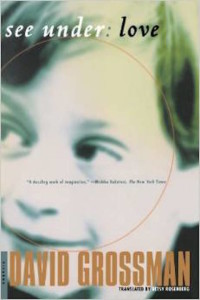Years of delving into various explanations for the Holocaust have brought me to the conclusion that this horrific historic phenomenon cannot be fully understood. Though some historical interpretations are fascinating, thought-provoking and intriguing, they always leave me thinking that they do not provide sufficient historical reasoning. In fact today, when a huge body of research is devoted to the analysis of Nazism and its consequences, one can hardly find a fresh perspective.
In See under: Love the Israeli author David Grossman (1954- ), depicts a most unusual perspective of the Holocaust: that of a child, a son of Holocaust survivors. The book consists of four interrelated stories. The first, Momik, describes how a nine year old boy slowly comprehends what happened ‘over there’, in Germany and Eastern Europe.
The story begins as the brother of Momik’s grandmother is brought from a mental institution to live with the family: an old man, detached from reality, believing that he is still under Nazi occupation. Momik likes ‘the new Grandfather’. He takes care of him, and follows him when he goes outside. Day after day Grandfather sits on a street bench, making weird motions and saying strange words. Gradually, from hidden basements and hiding places, other Holocaust survivors emerge, “very old people no one had noticed in the neighborhood before”, and they all gather around Grandfather, speaking of things only they can comprehend. The nine year old boy is “casually standing beside the bench”, listening attentively.
Clearly he can’t figure out what they are talking about; but he notices that some words keep coming up: ‘over there’, trains, roundups, Aktions (the assembling of Jews before their deportation to concentration camps), Sonderkommando, parades. Momik invents an imaginary children’s story, in which all these words make sense. Grandfather and his friends, along with his parents, must have lived in an enchanted kingdom, called ‘Over There’, with knights and castles, Indians attacking the kingdom, and brave commando soldiers defending it. The kingdom had a king and a queen, castles and bridges, and bright shining trains: “also there were trains around, but this part isn’t so clear. Maybe those trains are like the ones his secret brother Bill tells him about, the trains attacked by savage Indians. Everything is so mixed up. And there were also big campaigns called ‘Aktions’, and sometimes (probably to make the people feel proud) they would have really incredible parades, like the one we have on Independence Day. Left, right, left, right, papa screams in his sleep, Links, recht, he screams in the German language Bella will positively not translates for Momik.”
So this smart and imaginative young boy embeds Grandfather’s strange words in imaginary scenery. However, there is one expression he finds hard to understand: all Holocaust survivors speak of ‘the Nazi beast’, and young Momik can’t figure out what creature they are talking about. Bella, a neighbor, explains that this animal emerges in darkness, and it “could come out of any kind of animal if it got the right care and nourishment”. Momik then locks some animals in the basement, hoping ‘the Nazi beast’ will emerge.
But this imaginary world, of knights and soldiers, stands in contrast to another childish observation: Momik feels Grandfather’s pain, the distress and melancholy of the Holocaust survivors. He wants to capture ‘the Nazi beast’ and “tame it and make it good”, so the cause of their suffering will be removed. He decides to turn to the library, looking for information on this mysterious animal. It is there that he is gradually exposed to the shocking images of the Holocaust. He sees a picture of a boy holding his hands up (why weren’t his parents taking care of him?), another of a father and mother forced to choose between two children (why choose one and not the other?), a soldier forcing one old man to ride another old man. The most blunt and unbearable images of the Holocaust are there; Momik sits in the library for hours, looking at them, one after the other.
This childish journey towards an understanding of ‘the Nazi beast’ is really an attempt to grasp Nazism in the most basic, rudimentary terms. The lack of intricate phrasing emphasizes the simple questions we all ask: how could this have happened? Is there anything that could account for the plentitude of details that make up the humiliations, brutality, genocide?
Yet, just as important as the historical question – depicted here in a brilliant and original manner – the story illustrates the devastating influence of the encounter with pure evil. Momik’s psychological condition deteriorates; by the end of the school year he is being sent to a boarding school, where, his mother says, he would have “fresh air and good food”. One cannot have a normal childhood surrounded by people living with such unbearable memories. David Grossman fully encapsulated the experience of children of Holocaust survivors, who grew up in abnormal conditions, fully aware of their parents’ traumas yet never being able to ask about them – or accept the answers.

i can never explain how it felt growing up with two tortured people who I felt instinctively I had to protect from the horror that happened to them. I never saw my father smile.
Yes, I agree.
The Holocaust is one of the saddest moments of human race’s history